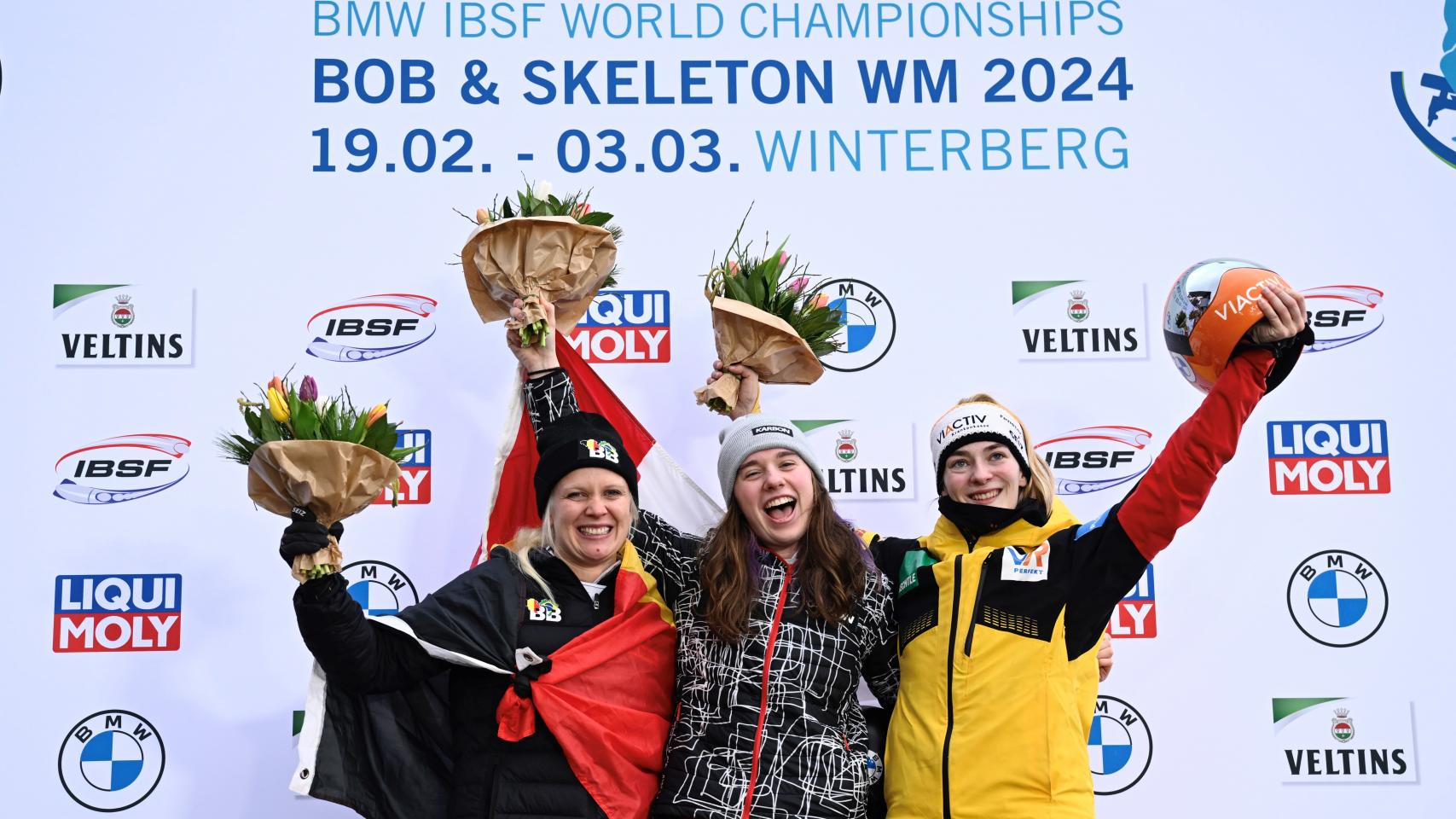Hallie Clarke Wins Skeleton World Championships in Winterberg
WINTERBERG, Ger.—Hallie Clarke slid her name into the history books as the youngest woman ever to win a skeleton World Championship title.
The 19-year-old became just the fifth Canadian ever to slide headfirst to the top of the World Championship podium, and just the second woman. Clarke shocked the world to take the gold medal on Friday in Winterberg, Germany.
“It’s crazy. It still feels like a dream. It was my goal today to just have fun no matter what,” said Clarke, who did not reach the World Cup podium this year. “I never expected to be in this position. I have been very nervous. I’m still shaking from all the adrenaline, but I just tried to remind myself that I love sliding and racing.”
Michelle Kelly is the only other Canadian woman to win a World Championship crown. She accomplished the feat 21 years ago at the 2003 premier event in a non-Olympic year in Nagano. Three Canadian men also have World Championship crowns. Jeff Pain (2005 Calgary), Duff Gibson (2004 Konigssee, Germany), and Ryan Davenport (1997 Lake Placid, 1996 Calgary). Gibson and Pain finished one-two at the 2006 Olympic Winter Games.
“It is such an honour to have my name mentioned with this group and be a part of that history,” said Clarke. “Today really shows the direction our program is heading, and I think a big part is the support that we have here for the team.”
Clarke, of Brighton, Ont., clocked a golden four-run time over the last two days at 3:51.27. Belgium’s Kim Meylemans was second with a time of 3:51.49, while Germany’s Hannah Neise claimed the bronze medal with a time of 3:51.53.
Clarke, who also won the 2023 Junior World Championships on the 1,330-metre Winterberg track one year ago, had a narrow .03 lead after the first two runs on Thursday.
“We did a training week here before the Altenberg World Cup and I think that extra time that I had here really helped. Last year, it felt so quick, and I didn’t get a good grasp of the track,” added Clarke. “I love the gliders track feeling of Winterberg, but I really don’t have a lot of experience here, so it was a bit of a surprise yesterday to be in contention to be a World Champion.”
The soft-spoken Canuck saved her best for last. Tied at the top with Germany’s Neise after putting down the second-fastest run in the penultimate heat, Clarke became the youngest women’s skeleton champion in history after she clocked the fastest run of the competition at 56.93 in the final heat.
“There was a lot of nerves that continued into the night and the morning, but having family and all of the team around reminding me of why I do this and to have fun was very important. I kept reminding myself why I started to do this in the first place – because it is fun – and no matter what happened today I had the time of my life yesterday,” said Clarke, who added that she has her mom with her for the event.
World Cup skeleton races are normally two runs. The Olympics and World Championship races are four runs held over two days.
“The (four-run format) is pretty difficult to be consistent. The consistency is something I have been working on all year. I have had lots of great runs and then another that is okay. To be consistent over four runs is a great feeling. It is hard to keep your mind in it for that long, so I’m really proud to be able to do that.”
One of Canada’s most consistent head-first sliders over the last decade, Ottawa’s Mirela Rahneva – who won a bronze at the World Championships one year ago in St. Moritz, Switzerland and slid to her fifth World Cup victory earlier this year – was seventh in Winterberg on Friday with a combined time of 3:51.63. Rahneva’s teammate at the last two Olympic Games, Jane Channell of North Vancouver, slid to 11th spot at 3:52.72.
Born in Ontario, Hallie Clarke has resided throughout Canada and the United States with her family. She discovered skeleton relatively young after seeing a sign in Calgary's WinSport Canada Olympic Park.
A multi-sport athlete before trying skeleton, Clarke comes by her athletic talent honestly as both of her parents were talented athletes. Her mom was a highly competitive figure skater in Canada that has since become a predominant power skating instructor. Her dad was an NCAA hockey player and a Toronto Maple Leaf draft pick.
At just 17 years old, Clarke had a breakout season during the 2022 Olympic year, finishing second overall on the Intercontinental Cup circuit. Last year she competed for the United States, her home for 13 years. In her inaugural World Cup season, she earned two silver medals and a top-10 finish at the World Championships as the youngest athlete on tour before topping her season off with the U20 Junior World Championship title.
With the positive changes occurring in the Canadian skeleton program, Clarke decided to make a return north of the border, and is now back with the maple leaf on her back. It was the appointment of Joe Cecchini as head coach that made the decision easy for Clarke. Cecchini has been her coach since she was introduced to the sport at just 14 years of age.
The Canadian teen now adds her name to a list of legendary Canadian skeleton athletes who have won World Championship medals. The distinguished group includes: Ryan Davenport; Olympic gold medallists, Jon Montgomery and Duff Gibson; Olympic bronze medallist, Mellisa Hollingsworth; Olympic silver medallist, Jeff Pain; Lindsay Alcock; Michelle Kelly; Sarah Reid; Elizabeth Vathje, who won bronze at the 2015 World Championships in Winterberg; and Mirela Rahneva.
“It means everything to me to be on this list. It is such an honour to be in that group,” added Clarke. “You hear all of these names, and I’m reminded that is the goal. These are the people you are aspiring to become. One of my goals in this sport was always to be World Champion, and it came a lot sooner than I thought.”
Blake Enzie was the only Canadian in the men’s skeleton race. The Canadian clocked a four-run time of 3:50.27 to finish in 24th spot.
Germany’s Christopher Grotheer won the men’s World Championship title 3:44.91.
The World Championships continue on Saturday with the skeleton mixed team event.
Complete Women's Skeleton Results:
https://www.ibsf.org/en/result/502965/?cHash=ef50d6c33c1f927df5432f5802ad0b1c
Complete Men’s Skeleton Results:
https://www.ibsf.org/en/result/502956/?cHash=4a934f91721b37d7231526d7bc1886ff
Bobsleigh CANADA Skeleton is a non-profit organization and the national governing body for the sports of bobsleigh and skeleton in Canada. With the support of its valued corporate partners – Karbon, Athabasca Oil Corporation in collaboration with Canada Actions I Love Energy – along with the Government of Canada, Own the Podium and the Canadian Olympic Committee, Bobsleigh CANADA Skeleton develops champions in the community, on and off the track, who have a passion for bobsleigh and skeleton. Please visit us at www.bobsleighcanadaskeleton.ca.

